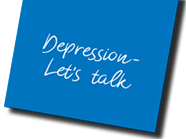Become informed
Depression is very common: in fact it is one of the most common mental health problems. One in four or five individuals will experience depression at some stage in their lives.
Sometimes depression occurs for no apparent reason. When there is a clear-cut problem and people solve it, or when they come to terms with their situation, or find support, the symptoms associated with depression may ease but in most cases they do not disappear without treatment.
When depression is present, people have signs and symptoms but they might not be aware of this. They might only start to sense that they have a serious problem when they just can’t get rid of it, when it begins to have a negative effect on the person's ability to perform their daily activities, or when it becomes so severe that life seems pointless.
How normal are their feelings?
Even though depression is a common experience, there is a lot of misunderstanding around it.
One problem is that people use the word "depression" to describe the ups and downs of life. If life is proving difficult, with money worries, unemployment or just not receiving a work promotion, relationship problems like the breakup of a romantic affair, worries about the results of a test, or getting sick or ill, it seems natural for a person to state he or she is ‘depressed’.
For many people the feeling of being “depressed” is the understandable result of these circumstances, and this can be referred to as “mental distress”. This is a natural and normal reaction to adversity and loss, and this is part of a healthy and adaptive process. When people experience this kind of individual suffering and distress, which can be mild to severe in intensity, they can experience some symptoms such as sleep, appetite or sexual difficulties, or even headaches or a peak in blood pressure.
Mental distress can be acute and last some hours or be more severe and prolonged for weeks, even months, like mourning the death of a loved one or the end of a long-term relationship. In these more severe examples of common responses to common life events, there is a risk that an individual develops depression.
Take a test for your family /friend in the box 'Recognising Depression' on the left side of the page.
Depression is an illness
In contrast to mental distress in reaction to life events, mental disorders such as depression are less common and may occur with or without any obvious cause. Mental disorders may be severe and long lasting, and can affect a person’s daily life. In such cases, it is likely that a person will need professional help. It is important that an accurate medical diagnosis is determined and that special interventions such as medication or psychological treatments are being put in place.
Depression is a clinical term describing a medical condition that affects the way mood is controlled by the brain – a mood disorder. Depression affects feelings, thoughts and body functions. Experiencing depression involves intense negative emotions and feelings and loss of interest, fatigue, change in sleep, sexual activity and weight or appetite, negative ideas such as pessimism, low self-esteem, indecisiveness and suicidal ideation, and other specific symptoms. On the whole, these symptoms will produce an undesirable effect on people's lives, for example impacting on personal wellbeing, work and relationships.



